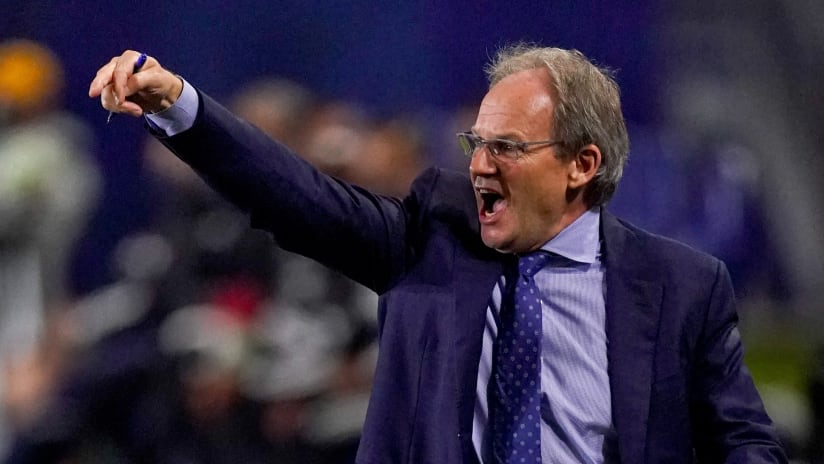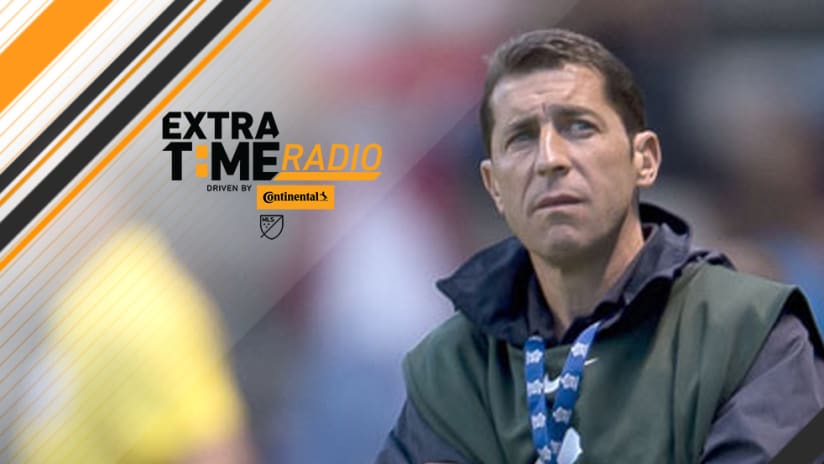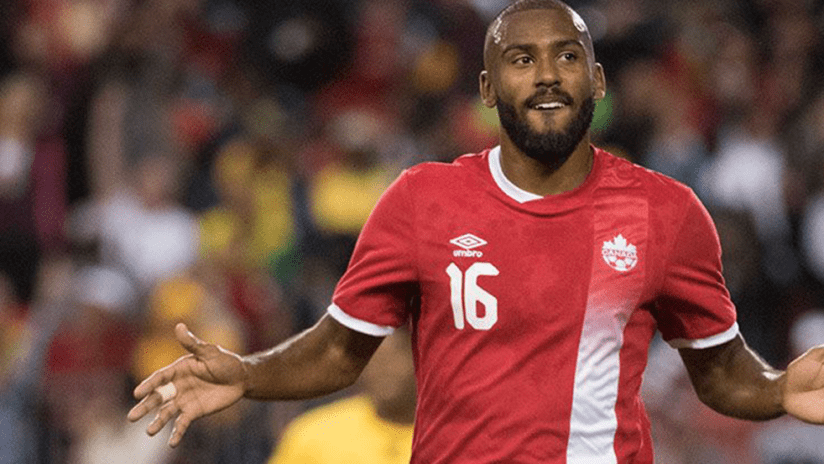VANCOUVER, B.C.—There are several ways you can build an MLS roster: Some teams will spend money, bringing in established players, often big-name stars; others will shop through the draft, and comb the rosters of the US or Canadian national teams; and others still invest in youth, developing their academy kids and adding a smattering of other talent.
No one way is correct or guarantees success, but when it comes to risk versus reward, short-term failure comes at a much lower cost for those that choose Door No. 3. And long-term, well … how could it be a bad thing to create a pipeline of local talent?
So goes the roster-building process of the Vancouver Whitecaps, partly by choice and partly by necessity.
“Not every team in this league can go out and spend fortunes,” says second-year head coach Carl Robinson. “We can't. That's not a shock to me. I knew those were the parameters I was working under. My job is to go and find those little hidden gems somewhere. We've managed to do that.”
It’s an approach that’s surpassed expectations in 2014 and 2015. The ‘Caps have followed last year’s playoff appearance with a charge to the top of the Western Conference, tussling with big-spenders LA and Seattle all season.
But the emphasis remains on 2016 … and 2017, and 2018, and further still. That means signing and developing young talent.
"In any organization you need to have a plan about what you're trying to do,” Robinson says. “If you don't get that plan correct, you might be successful one year, two years, but you won't be consistent over a period of time.
“What I tried to do here 18 months ago was reduce the age of the squad. I wanted to give opportunities to younger players we had in our residency program as well as finding top young South American and Central American talent that I knew would be affordable to us.”
The ‘Caps are already reaping the rewards. Up next? Canada.
Vancouver head coach Carl Robinson has been the catalyst for the team's transformation into one of of the youngest in MLS. And his goal is to make sure there's a pipeline of local talent feeding the MLS side for years to come. (Bob Frid / Vancovuer Whitecaps)
It’s widely known that Robinson has assembled a young squad, but exactly how young is perhaps not fully appreciated.
Twenty-one of Vancouver’s current MLS roster are aged 24-years-old or younger, with four still in their teens. Three (Kekuta Manneh, Matias Laba and Octavio Rivero) made this year’s 24 Under 24, and the ‘Caps currently boast the most Homegrown players in the league (8).
And they’re far from finished.
“I want to progress the young players through the residency program – the Canadian element,” Robinson says. “When they're ready to play 20-odd games, then they will get their opportunities to do that.
“They will get their chances … I'm willing to do that in the short term to get the medium- and long-term benefit to the club."
While Robinson’s presence as the first-team head coach has catalyzed this growth, he’s not starting from scratch. The Whitecaps Residency program has long been viewed within North American soccer circles as a flagship academy, and the team's ambitions aren't constrained by the city limits. Vancouver have expanded their key curriculum, developing academy centers throughout the rest of the province, as well as Saskatchewan, Manitoba and most recently Ontario.
That’s 10 centers in 14 different cities, and the powers that be view it as the early implementation of their long-term strategy.
“The academy centers are something that we are proud of,” says Whitecaps President Bob Lenarduzzi. “As time goes on, I think we’ll be even prouder, and we intend to have our footprint all over Canada.”
Vancouver's Residency program has already born fruit, and now they're expanding across Canada with 10 new academy centers. (Bob Frid / Vancouver Whitecaps)
The persistent issue for Vancouver has been what to do with all this talent coming through the system. Starting jobs in MLS are limited, because breaking into the first team means outplaying the likes of Laba, Rivero, Kendall Waston or Pedro Morales. Few kids are ready for that.
That’s left heading to Europe or going the college route as the main considerations for many Residency graduates, and talent has been lost – or stunted – as a result.
It’s a problem the club hope they’ve begun to address with this season's addition of a USL team. WFC2 could bridge the gap between academy and first team, creating an extended pathway and development guideposts for local kids to grow into elite, international-caliber talent.
Early returns are promising. The clear progression from pre-teen to first team is one which the Residency coaches regularly use as motivation in team talks and developmental sessions.
"That's the piece of cheese, the bait, that we have for these guys who develop,” says Residency coach Niall Thompson. “The pathway's set. It's a chance for them to play in a professional league, against full-time players, all the time. Signing a pro deal, either USL or MLS – that's what the goal is.
"The USL, it's driven up hopefully their passion and the development process. We want to continue this now, and add two or three every year. That's the plan.”
It’s one that’s well underway.
MLS loanees aside, the current WFC2 roster contains 20 players. Thirteen of those are Canadian, with seven graduating from the ‘Caps Residency program. That latter number includes Vancouver’s three most recent signings.
Defender Kadin Chung, as well as midfielders Terran Campbell and Thomas Gardner, inked their first professional deals with WFC2 at the end of last month. All three are part of the Whitecaps U-18 side for the current season and are Canadian youth internationals. Gardner is 17 years old; Campbell and Chung, just 16.
All three have made their professional debuts in recent weeks.
Having identified their potential, Robinson was keen to show the Whitecaps’ commitment to their footballing futures and learn from lessons of the past.
"Well, we don't want to lose them, that's the first thing,” Robinson says. “I think that's the important thing, if I'm being totally honest. Nowadays, in this environment, if you've got any special players that you think are good enough to have a possibility of making the professional grade at our club, then it's important that you look after them.
“You don't know when players develop, that's the tricky thing about it. These young players have done fantastic in their age group. We think they're ready to step up, maybe in a year or two, and it's part of the development of it."
Whitecaps Residency product Russell Teibert has paved the way for the next generation, and is earning regular minutes for both the 'Caps and Canada. (USA Today Sports)
They will reach a first-team roster that's likely to have a more Canadian flavor. Residency alumni Russell Teibert (22), Kianz Froese (19) and Sam Adekugbe (20) have all received significant minutes this season, and all are expected to feature for Canada in upcoming World Cup qualifiers. Marco Bustos (19), the centerpiece of WFC2’s attack, could join them early next season, as could several other Residency products impressing in the USL.
A strong and steady flow of talent moving from the Residency into WFC2 and then the first team is burbling, but three players aren’t enough: Vancouver executives say the ultimate goal is to have 50 percent of the MLS roster made up of Homegrown players, sketching out a timeframe of 5-to-10 years for that goal.
It’s a feat to which Robinson also aspires, but he still errs on the side of caution.
"Well we've got eight [Homegrowns] on our roster at the moment, from 20 to 28,” Robinson says. “That's a decent start for us.
Kianz Froese helped Vancouver to their first-ever Canadian Championship in August, starting the first leg and getting an assist against Montreal. (USA Today Sports)
“The next challenge is to try and get a number of Canadian players in the starting lineup. It's going to take time. It doesn't happen overnight and I'm not saying it's going to happen overnight.”
Achieving those lofty Homegrown goals will come down to talent and training. That’s been the gap many Canadians coming through the country’s current development system have been unable to hurdle, routinely surpassed by overseas talent before age 20.
As a result, Vancouver’s current first-team roster is loaded with South Americans hungry for the stability and competition MLS can offer. Given that influx, five years might not be enough for Vancouver to develop their Canadian counterparts.
"What you tend to find in Europe and South America is that young players tend to go the professional route at 17, 18 years of age and they don't go the college route,” Robinson says. “I'm not saying it's the right route, I'm saying it's probably the first major decision that parents have to make if they want to go professional and get on that ladder sooner rather than later.
“Identifying young South American talent is good, because they've been in the breeding ground of professional football at a younger age. Whereas if you come out of college at 22, 23, then you're a couple of years behind.”
It’s for that very reason that Robinson pulled the trigger early on Campbell, Chung and Gardner, and it’s likely to set the trend for how the Whitecaps deal with their younger players moving forward.
That’s all part of creating the right environment at the club: one that breeds success but also creates pressure: to succeed, to shine, to impress.
Pressure, in short, to be a professional. Not all of the local talent will be able to handle it, but for Thompson, himself a former Canadian international, it’s a necessity to prepare them for a career in the game.
"The thing is, if they're playing in the first team, they need that pressure,” Thompson says. “You have to be able to grow up and have that tension, knowing that I need to make it as a professional, so what do I have to do? We can break it down into detail with them.
“For me, it's a part of the process. Yes, it can get overwhelming at some point. I say, that tension is fuel. To have tension should fuel your performance. We should use it as a positive outlet on the field."
For now, and for the future.













